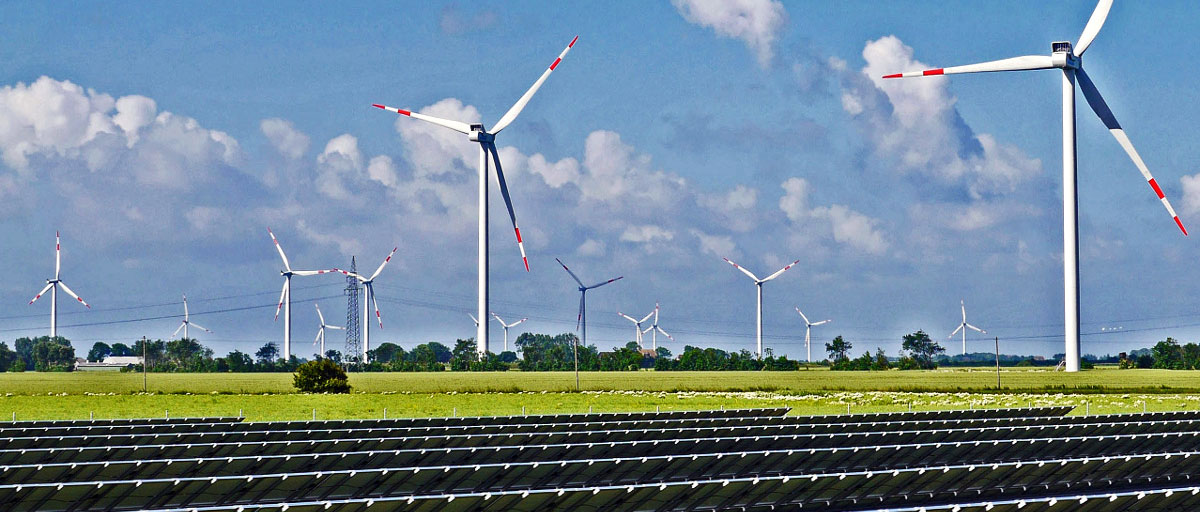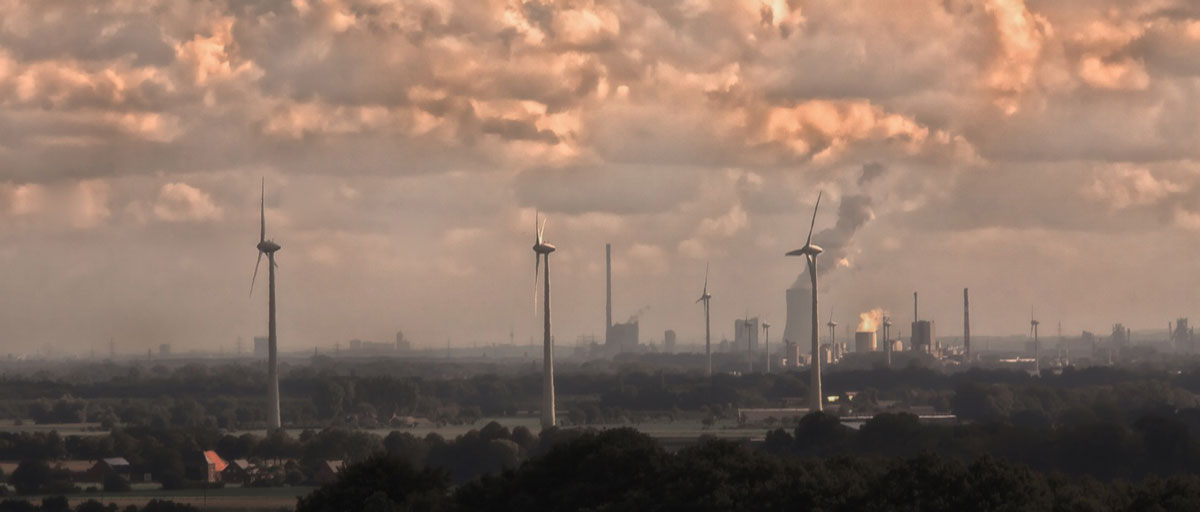
A report published in conjunction with the opening of the 2018 Global Climate Action Summit in San Francisco, shows the potential to halve greenhouse gas emissions by around 2030. Stronger policies, the digital revolution and greater climate leadership are necessary to accelerate the economic transformation, say the authors. Photo: Pixabay
Bildtext får vara max två rader text. Hela texten ska högerjusteras om den bara ska innehålla fotobyline! Photo: B. Christensen/Azote
CLIMATE POLICY
Halving greenhouse gas emissions by around 2030
Digital revolution and market forces poised to drive economic transformation away from fossil fuels, but not without the right policy mix and bold climate leadership
• Report shows all sectors of the global economy have potential to rapidly halve emissions of greenhouse gases with existing technologies and changing behaviour, but beyond electricity generation, pace too slow
• Global capacity of solar and wind power is now doubling at a pace fast enough to provide over 50% of global electricity supply by about 2030, assuming pace is maintained and renewables replace fossil-fuels
• The digital revolution is a wildcard in economic transformation. It already influences the decisions of three billion people and businesses every day and is poised to profoundly disrupt the global economy in the next decade. The expected digital disruption can help determine whether we live on a 1.5-2°C planet or a +3°C world
(Svensk sammanfattning av artikeln finns längst ner på sidan).
A report published in conjunction with the opening of the 2018 Global Climate Action Summit in San Francisco, shows the potential for all sectors of global economy - energy, food and agriculture, industry, buildings and transport - to halve greenhouse gas emissions by around 2030. Stronger policies, the digital revolution and greater climate leadership are necessary to accelerate the economic transformation, say the authors.
The report, launched by Christiana Figueres and former centre director Johan Rockstöm, concludes that the energy transformation in the next decade could occur much faster than many forecasts as the price of renewables drops low enough to outcompete fossil fuels. But keeping up the pace will require sharper policies to push out fossil fuels. Other sectors, however, are off track.
"All solutions exist to begin halving emissions immediately. Now is the moment to move from incremental to exponential action," says Rockström. He is co-chair of Future Earth and incoming co-director Potsdam Institute for Climate Impact Research.
The digital revolution remains a wildcard, says the report. Technology can directly influence 30% of the emissions cuts needed by about 2030, and indirectly affect the rest through influencing consumer habits, scaling up a sharing economy and supporting business transformation to a circular economy.
The full report is available at www.exponentialroadmap.org
Disruption is here. Three unstoppable forces are pushing us towards a future of prosperity, growth and clean energy: climate leadership, market forces and the digital revolution
Christiana Figueres, convenor of Mission 2020, a partner in the report
The power of exponential growth
Greenhouse gas emissions must fall sharply to stabilise climate well below 2°C and aim for 1.5°C as agreed by nations in Paris in 2015. Emissions peaking in 2020 and approximately halving by about 2030 is consistent with the Paris Agreement’s aim.
"Right now, it is easier to imagine a global climate catastrophe than a rapid economic transformation, yet the next decade could see the fastest energy transition in history," says co-lead author Owen Gaffney from Future Earth and the Stockholm Resilience Centre.
“People underestimate the power of exponential growth. In Norway, electric cars went from 6% of new sales to 47% in five years. If renewables keep doubling every five or six years, as they have for a decade or more, they will push out fossil fuels much faster than most forecasts. But not without stronger policies,” he added.
The authors argue that the digital revolution is already driving an economic transformation.
"How this revolution is directed could make or break international climate targets. The tech sector can influence whether we live on a 1.5-2°C planet or on a +3°C world," says Johan Falk co-lead author from Future Earth and the Stockholm Resilience Centre.
“Technology will not solve the climate challenge alone. The key is to reach a critical mass of companies, cities, nations, industries and citizens that are contributing to the Paris Agreement and show how attractive this is - this will create the snowball effect we need to scale solutions”, says Falk.
Game-changing strategies
The roadmap identifies the accelerators in terms of climate leadership, policy and technology required to scale 30 solutions and concludes that a set of game-changing strategies in the next 18 months are needed to keep up an appropriately fast pace.
These strategies include:
• Accelerate climate leadership initiatives exponentially among companies, cities, industries and individuals to reach a critical mass with goals and actions to halve emissions fast
• Create task forces to build momentum to end fossil-fuel subsidies, build out carbon pricing and wide-scale adoption of circular-economy approaches, as part of a broader goal to have coherent policies to shift away from fossil fuels
• Launch global tech initiatives, or “accelerators” to align the Fourth Industrial Revolution (digitalisation, artificial intelligence, cloud computing, internet of things, etc) with the goal to halve global greenhouse gas emissions by 2030 - specifically to explore how tech giants can use their influence to support societal goals
Pushing beyond conventional wisdom
The report highlights that many companies can cut their own emissions faster than 50% every decade - and influence their suppliers to do the same. The next frontier is how companies can influence the consumers of their products and services to support low-carbon operations and lifestyles.
"To win the fight against climate change, we need to constantly push beyond what conventional wisdom tells us is possible. The digital revolution is one of the most powerful tools at our disposal. Now, to realise the full potential, we need leadership and action: by policy makers, business leaders and all of us," says Mikko Kosonen, President of the Finnish Innovation Fund Sitra who produced the report together with Future Earth with WWF, Ericsson and Stockholm Resilience Centre and others.
"Disruption is here. Three unstoppable forces are pushing us towards a future of prosperity, growth and clean energy: climate leadership, market forces and the digital revolution,” says former UN climate head Christiana Figueres, convenor of Mission 2020, a partner in the report.
The report launch comes after months of unprecedented heat waves, droughts and flooding across the planet that have been linked to human-induced climate change that show even moderate warming can cause global-scale disruption. New research published in August 2018 shows the risks of crossing the 2°C threshold could be more severe than scientists previously realised.
The roadmap will be available as a ready-to-use digital dashboard. It is intended to be used in the future by companies, cities and countries to align their efforts with the Paris climate targets. The dashboard has been developed for the Swedish government to support its stated ambition to become carbon neutral by 2045.
The full report is available at www.exponentialroadmap.org
Svensk sammanfattning
Svenska forskare och företag i global rapport: så halverar vi klimatutsläppen till 2030
Den digitala revolutionen kan revolutionera klimatarbetet, men endast med rätt politik och framsynt klimatledarskap. En ny global rapport av bland andra Johan Rockström visar lösningar för att halvera världens utsläpp av växthusgaser sektor för sektor.
Huvudpunkter:
- Ny rapport signerad av bland annat miljöprofessorn Johan Rockström, FN:s tidigare klimatchef Christiana Figueres, Ericsson och Telia presenteras på guvernör Browns klimattoppmöte i San Francisco 13 september 2018
- Rapporten visar att alla sektorer i världsekonomin har potential att snabbt halvera sina utsläpp av växthusgaser med befintlig teknik och beprövad politik, men förutom i elsektorn är takten i omställningen för låg
- Den globala kapaciteten för sol och vindkraft ökar nu med en fördubblingstakt och de förväntas stå för över 50% av världens elförsörjning till 2030, förutsatt att takten upprätthålls och att förnybara energikällor ersätter snarare än adderar till fossila bränslen
- Den digitala revolutionen är världsekonomins joker. Den påverkar redan beslut som tre miljarder människor och företag tar varje dag och har potential att kraftigt omvandla den globala ekonomin under det närmaste decenniet. Den digitala sektorn kan påverka om världen blir 1,5, 2 eller 3 grader varmare.
Professor Johan Rockström öppnar 13 September 2018 Global Climate Action Summit i Kalifornien, tillsammans med Christiana Figueres som var chef för FN:s klimatkonvention och ledde förhandlingarna vid klimatmötet i Paris 2015. Deras budskap: Världen kan halvera utsläppen av koldioxid och andra växthusgaser före 2030 med befintliga lösningar och teknik. Under mötet i San Francisco presenterar de en global rapport som är resultatet av ett samarbete mellan forskare och företag i Sverige, bland annat Future Earth, Ericsson, Stockholm Resilience Centre, WWF och Telia Company. Rapporten lyfter fram den roll som digital teknik och icke-statliga aktörer som städer, kommuner, företag och individer, har för att nå klimatmålen.
”Världen är vid en kritisk vändpunkt och insatserna kunde inte vara högre” säger Johan Rockström. ”Kurvan för växthusgasutsläppen måste böjas senast år 2020 och sedan falla dramatiskt - ungefär halveras vart tionde år för att vi ska klara Parisavtalet. Konsekvenserna av att missa detta mål är potentiellt katastrofala för mänskligheten. Nu finns lösningarna för att börja halvera utsläppen omedelbart, det är dags att gå från stegvisa till exponentiella åtgärder."
"Just nu verkar många ha lättare att föreställa sig en global klimatkatastrof än en snabb förändring av världsekonomin, men nästa årtionde kan ge oss den snabbaste energiomställningen i historien", säger en av rapportens två huvudförfattare Owen Gaffney från Future Earth och Stockholm Resilience Centre.
The full report is available at www.exponentialroadmap.org
For more information about the report, please contact:
Alistair Scrutton, Future Earth Communications
alistair.scrutton@futureearth.org
+ 46 707 211 098
Denise Young, on behalf of Future Earth Communications
younglld@gmail.com
+ 33 6 5115 1952
Spokespeople
Johan Falk, report co-author, Innovation Fellow, Future Earth and Stockholm Resilience Centre
johan.falk@futureearth.org
Owen Gaffney, Report co-author
owen.gaffney@su.se
Amy Luers, Future Earth Executive Director
amy.luers@futureearth.org
Johan Rockstrom, former director of the Stockholm Resilience Centre and incoming director of the Potsdam Institute for Climate Change Research
johan.rockstrom@su.se
Oras Tynkkynen, Senior Advisor, Finnish Innovation Fund Sitra, oras.tynkkynen@sitra.fi
Mats Pellbäck Scharp, Head of Sustainability, Ericsson
mats.pellback.scharp@ericsson.com
Stefan Henningsson, Senior Advisor Climate, Energy & Innovation, WWF-Sweden
stefan.henningsson@wwf.se









